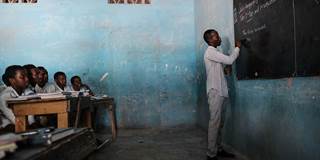At the World Bank and the IMF’s upcoming annual spring meetings, delegates will reinforce the case for multilateral cooperation. In particular, they will be discussing the International Finance Facility for Education, a bold plan to ensure that all of the world’s 1.6 billion boys and girls are in school and learning.
LONDON – In a confrontational world where protectionism is on the rise, multilateralism has become an easy target for criticism. But those who doubt its value must have short memories. They seem to have forgotten that the Marshall Plan rebuilt Europe after World War II, NATO kept nuclear war at bay during the Cold War, and foreign aid lifted millions of people out of poverty in just the past few decades.
At the World Bank and the IMF’s upcoming annual spring meetings in Washington, DC, delegates will be reinforcing the case for international cooperation. In particular, we will be discussing the International Finance Facility for Education (IFFEd), a bold plan to ensure that, for the first time in history, all of the world’s 1.6 billion boys and girls – including refugees and displaced children in low- and middle-income countries – are in school and learning.
The IFFEd draws its inspiration from two landmark examples of international cooperation: the joint IMF-World Bank Heavily Indebted Poor Countries Initiative, which wiped out $100 billion in unpayable debt; and the Global Fund to Fight AIDS, Tuberculosis, and Malaria, which has saved millions of lives by providing immunizations and other services.

LONDON – In a confrontational world where protectionism is on the rise, multilateralism has become an easy target for criticism. But those who doubt its value must have short memories. They seem to have forgotten that the Marshall Plan rebuilt Europe after World War II, NATO kept nuclear war at bay during the Cold War, and foreign aid lifted millions of people out of poverty in just the past few decades.
At the World Bank and the IMF’s upcoming annual spring meetings in Washington, DC, delegates will be reinforcing the case for international cooperation. In particular, we will be discussing the International Finance Facility for Education (IFFEd), a bold plan to ensure that, for the first time in history, all of the world’s 1.6 billion boys and girls – including refugees and displaced children in low- and middle-income countries – are in school and learning.
The IFFEd draws its inspiration from two landmark examples of international cooperation: the joint IMF-World Bank Heavily Indebted Poor Countries Initiative, which wiped out $100 billion in unpayable debt; and the Global Fund to Fight AIDS, Tuberculosis, and Malaria, which has saved millions of lives by providing immunizations and other services.